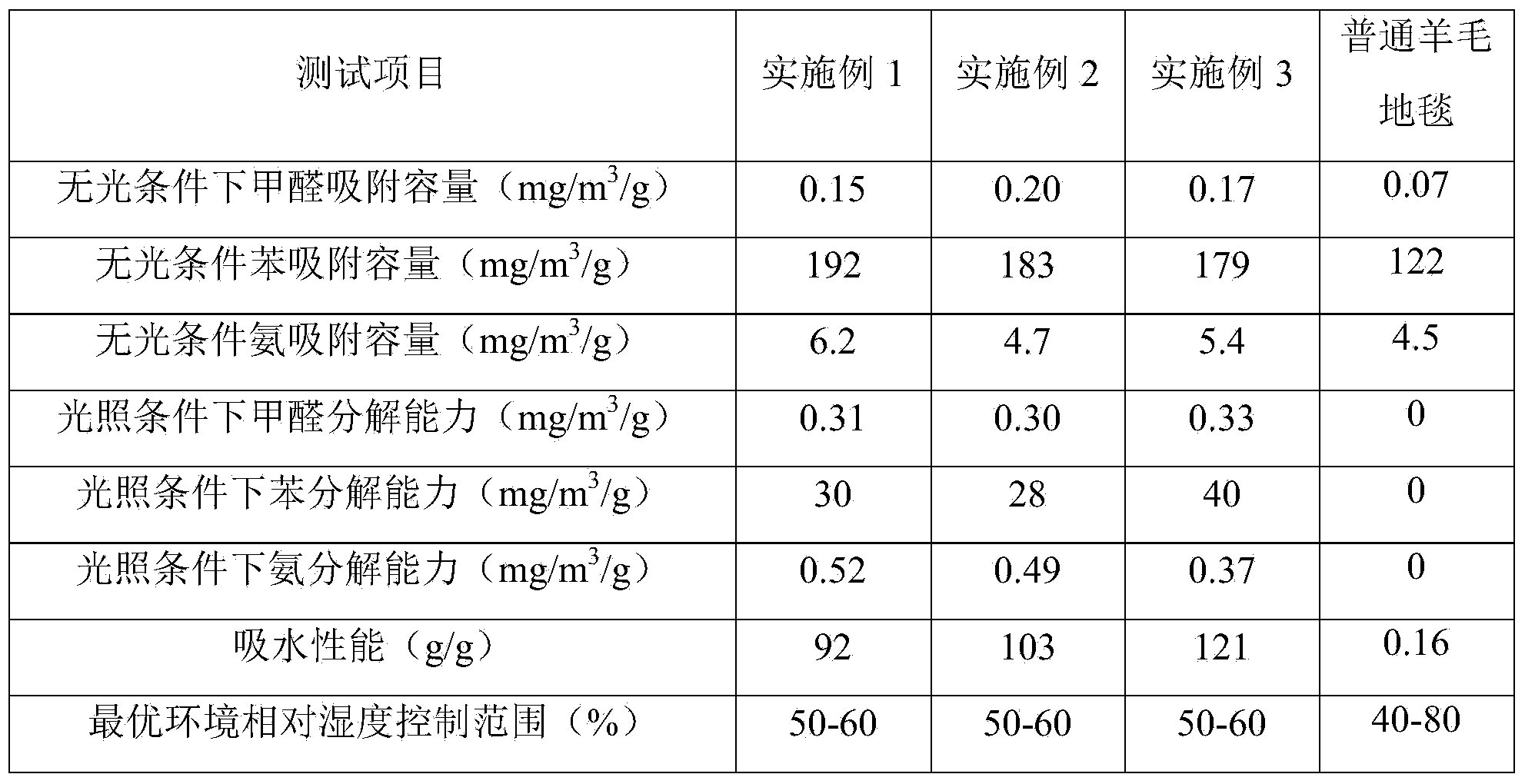Method for preparing photocatalysis self-cleaning nanometer fiber felt
A nanofiber, self-cleaning technology, applied in fiber processing, textiles and papermaking, non-woven fabrics, etc., can solve problems such as pollution, poor living conditions, and pollute the ecological environment, and achieve the effect of simple production process and decomposition of harmful substances
- Summary
- Abstract
- Description
- Claims
- Application Information
AI Technical Summary
Problems solved by technology
Method used
Image
Examples
Embodiment 1
[0026] A preparation method of photocatalytic self-cleaning nanofiber felt, comprising the steps of:
[0027] (1) Preparation of photocatalytic self-cleaning masterbatch
[0028] Commercially available nano-titanium dioxide powder (quality standard particle diameter 5-10nm) 150g, nano diatom mud powder 100g (wherein, active carbon white powder (quality standard particle diameter is 50-100nm, BET surface area is 5-300m 2 / g) 43.75g, diatom mud (quality standard particle size is 50-100nm, BET surface area is 5-300m 2 / g) 43.75g, YPO4: Ce, Th (mass standard particle size is 50-100nm, BET surface area is 5-300m 2 / g) 12.5g) and 750g of polyamide pellets, put into the extruder after mixing, extrude and pelletize at the working temperature of the extruder at 180°C to obtain photocatalytic self-cleaning masterbatch;
[0029] (2) Preparation of spinning solution
[0030] Add 1000g of photocatalytic self-cleaning masterbatches prepared in step (1) to 19000g of polyamide pellets, dis...
Embodiment 2
[0033] A preparation method of photocatalytic self-cleaning nanofiber felt, comprising the steps of:
[0034] (1) Preparation of photocatalytic self-cleaning masterbatch
[0035] Commercially available nano titanium dioxide powder (quality standard particle diameter 5-10nm) 40g, nano diatom mud powder 40g (wherein, active carbon white powder (quality standard particle diameter is 50-100nm, BET surface area is 5-300m 2 / g) 20g, diatom mud (quality standard particle size is 50-100nm, BET surface area is 5-300m 2 / g) 18g, MgSrBF3:Eu (mass standard particle size is 50-100nm, BET surface area is 5-300m 2 / g) 2g) and polylactic acid pellets 20g, put into the extruder after mixing, extrude and cut into pellets at the working temperature of the extruder to obtain photocatalytic self-cleaning masterbatch;
[0036] (2) Preparation of spinning solution
[0037] Add 100 g of photocatalytic self-cleaning masterbatches prepared in step (1) to 900 g of polylactic acid pellets, dissolve in...
Embodiment 3
[0041] A preparation method of photocatalytic self-cleaning nanofiber felt, comprising the steps of:
[0042] (1) Preparation of photocatalytic self-cleaning masterbatch
[0043] Commercially available nano-titanium dioxide powder (quality standard particle diameter 5-10nm) 30g, nano diatom mud powder 29.9g (activated carbon white powder (quality standard particle diameter is 50-100nm, BET surface area is 5-300m 2 / g) 13.3g, diatom mud (quality standard particle size is 50-100nm, BET surface area is 5-300m 2 / g) 13.3g, MgSrBF3:Eu (mass standard particle size is 50-100nm, BET surface area is 5-300m 2 / g) 3.3g) and 40g of polyacrylonitrile pellets, put into the extruder after mixing, extrude and pelletize at the working temperature of the extruder at 200°C to obtain photocatalytic self-cleaning masterbatch;
[0044] (2) Preparation of spinning solution
[0045] Add 99.9 g of photocatalytic self-cleaning masterbatches prepared in step (1) to 1235 g of polyacrylonitrile pellets...
PUM
| Property | Measurement | Unit |
|---|---|---|
| particle diameter | aaaaa | aaaaa |
| particle diameter | aaaaa | aaaaa |
| specific surface area | aaaaa | aaaaa |
Abstract
Description
Claims
Application Information
 Login to View More
Login to View More - R&D
- Intellectual Property
- Life Sciences
- Materials
- Tech Scout
- Unparalleled Data Quality
- Higher Quality Content
- 60% Fewer Hallucinations
Browse by: Latest US Patents, China's latest patents, Technical Efficacy Thesaurus, Application Domain, Technology Topic, Popular Technical Reports.
© 2025 PatSnap. All rights reserved.Legal|Privacy policy|Modern Slavery Act Transparency Statement|Sitemap|About US| Contact US: help@patsnap.com

